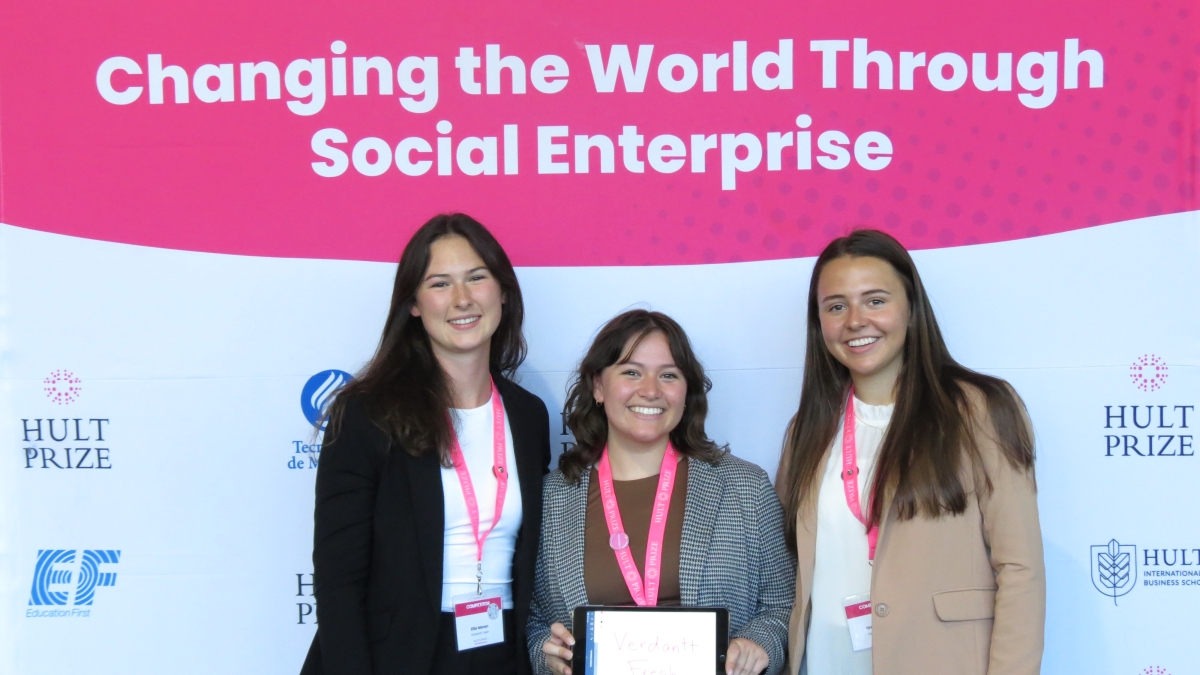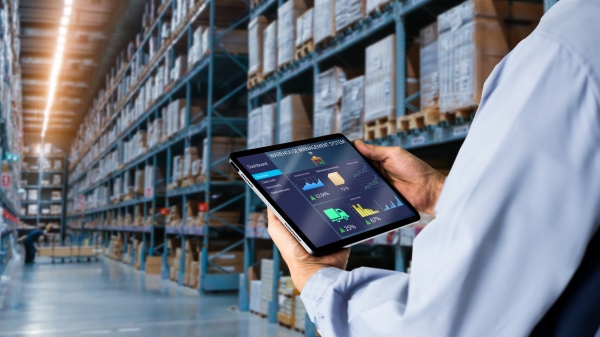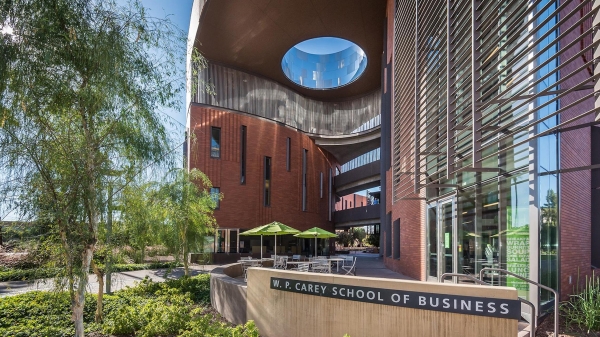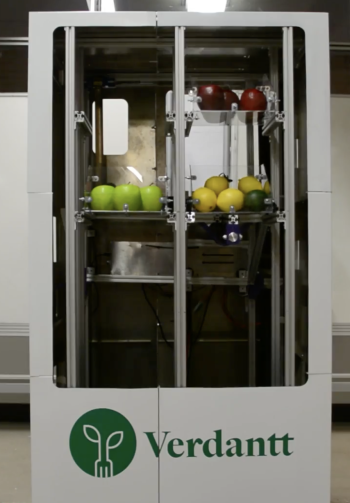ASU students seek to combat food waste, insecurity with innovative startup

From left: Ellie Moran, Christina Sturgeon and Grace Reiter present their startup, Verdantt Fresh, at the Hult Prize Monterrey Global Summit. Photo courtesy of Grace Reiter
While participating in student research with the Luminosity Lab, a group of Arizona State University undergraduate students decided to explore a topic that hits close to home for many college students: food insecurity and waste.
Excited by the potential of the project, the students were encouraged to develop an LLC.
And thus, from the “sustainability moonshot” project, Verdantt Fresh sprouted.
Verdantt Fresh aims to eliminate food waste and food insecurity through a two-pronged approach that pairs a fresh produce vending machine with an app that tracks expiration dates of produce, has tips to maximize produce use and a payment portal.
Ellie Moran, who is majoring in chemical engineering at ASU, was the team lead for the project, and Christina Sturgeon, a mechanical engineering major, spearheaded the mechanical efforts.
“Developing Verdantt as a startup was intimidating at first, especially since none of us had ever done anything like this before,” said Moran, who is also minoring in sustainability and business. “However, watching it progress so quickly and gaining the support of our peers and mentors has been incredibly rewarding.”
Grace Reiter, who was originally hired by the Luminosity Lab as a volunteer to help with the challenge, was asked to join as a co-founder.
“Watching Verdantt evolve has been the highlight of my college career,” said Reiter, who is majoring in sustainability at the College of Global Futures.
In June, Moran, Sturgeon and Reiter competed against 32,000 worldwide applicants at the Hult Prize Monterrey Global Summit, held in Monterrey, Mexico, where Verdantt Fresh was one of eight teams to advance to the second day.
“You find out if you are a finalist at the end of the competition, where you then pitch on the spot, so we were all in total shock walking up there,” said Sturgeon, who is also minoring in sustainability. “It was a great experience, and I feel so lucky to be part of such an amazing team.”
Although they weren’t chosen to advance to the Global Accelerator, the next round of the Hult Prize held in England, the team’s success in presenting among such a large group of applicants gave the Verdantt team more confidence as they continue on their startup journey.
Amanda Ellis, a former United Nations ambassador and senior director of global partnerships and networks for the Julie Ann Wrigley Global Futures Laboratory, has gotten to work closely with Reiter, who is currently an intern at one of the Global Futures Laboratory’s programs — the WE (women entrepreneurs) Empower U.N. Sustainable Development Goals Challenge.
Launched by the U.N. secretary general and the president of the World Bank at the U.N. General Assembly in 2018, the WE Empower Challenge is designed specifically to showcase innovative solutions from women-led social enterprises.
“Grace is the embodiment of the spirit of both the Global Futures Laboratory and the WE Empower competition with Verdantt Fresh, collaborating and innovating for regenerative and just global futures,” Ellis said.
According to the presentation Moran, Sturgeon and Reiter gave at ASU’s Carbon Summit, about 40% ($200 billion) of food in the U.S. is wasted, which results in the generation of methane gasses that are 30 times more harmful to the atmosphere than CO2. Moreover, access to fresh produce can be difficult for some populations, which contributes to high obesity rates in the U.S.
Their solution involves a fresh produce system similar to that of a vending machine, providing access to individualized portions of produce while eliminating overbuying and plastic packaging. The machines would aim to be located in high-density areas for living, working and educating.
Last November, the team was awarded a Changemaker Challenge Grant for $2,500, which they used to purchase components for a minimum viable prototype that they are planning to build this fall.
Between the Changemaker grant and those from Venture Devils and Cultivate Phoenix, the group has fundraised over $30,000, most of which will go toward the creation of their prototype.
The group is currently focused on building community and corporate partners with the goal of officially launching for public use in spring 2025.
More Business and entrepreneurship

Former COVID task force member on how to create a resilient health care supply chain
Medical supply shortages caused by the COVID-19 pandemic revealed the critical need to rethink and restructure the U.S. health care supply chain system. Rob Handfield…

New economics master’s degree delivers analytical, career-focused skill set
The W. P. Carey School of Business at Arizona State University has launched a new Master of Science in Economics (MS-Econ) program. The new degree is now accepting applications for the fall 2025…

Be the boss no one wants to leave
Story by Michelle Goodman Editor's note: This story originally appeared in the fall 2024 issue of ASU Thrive magazine.By now, we’ve all heard the statistics: Most U.S.…
